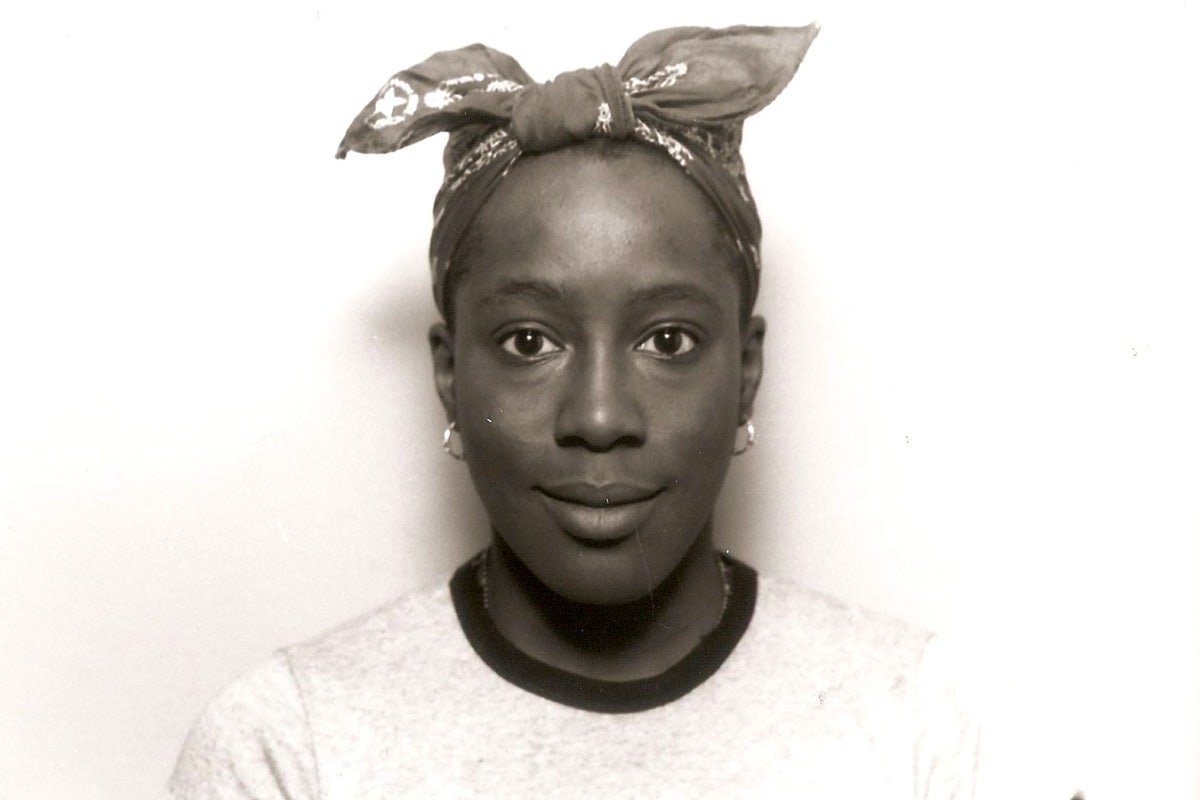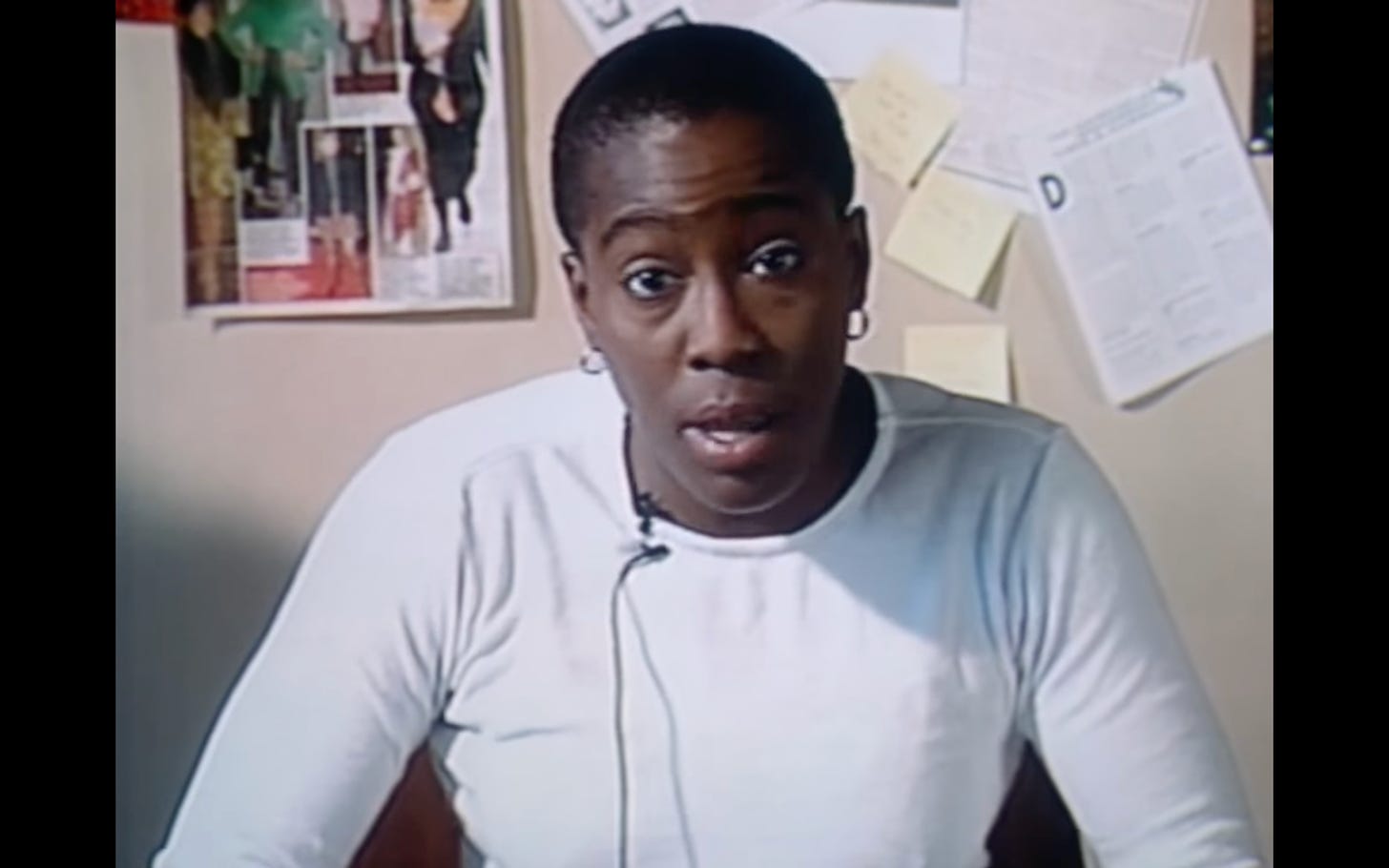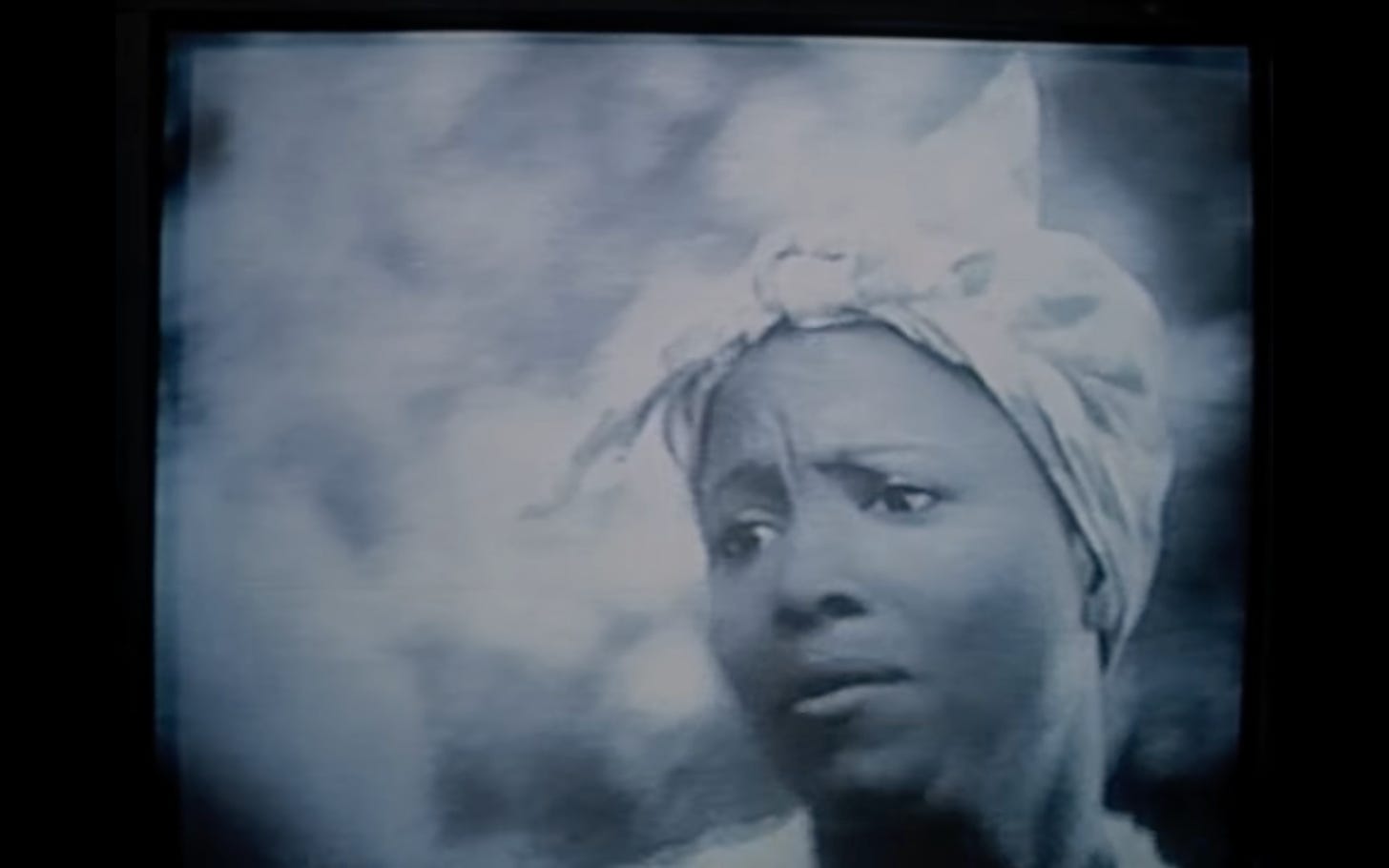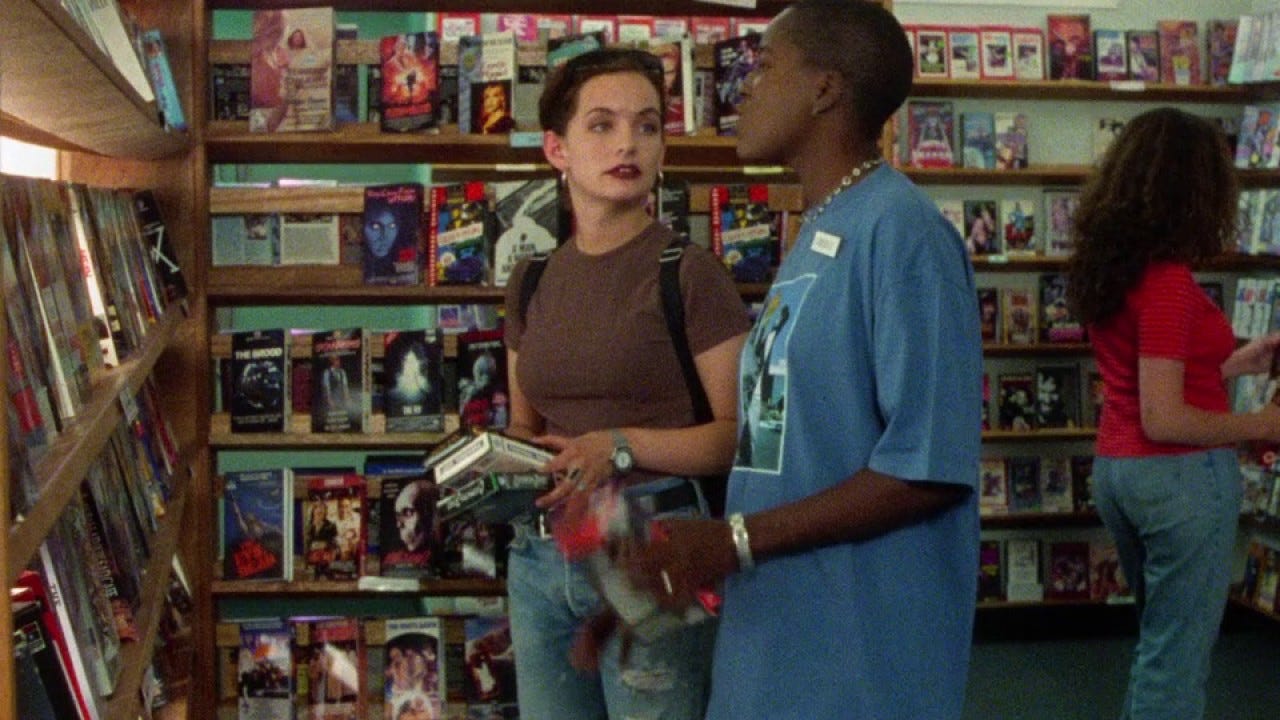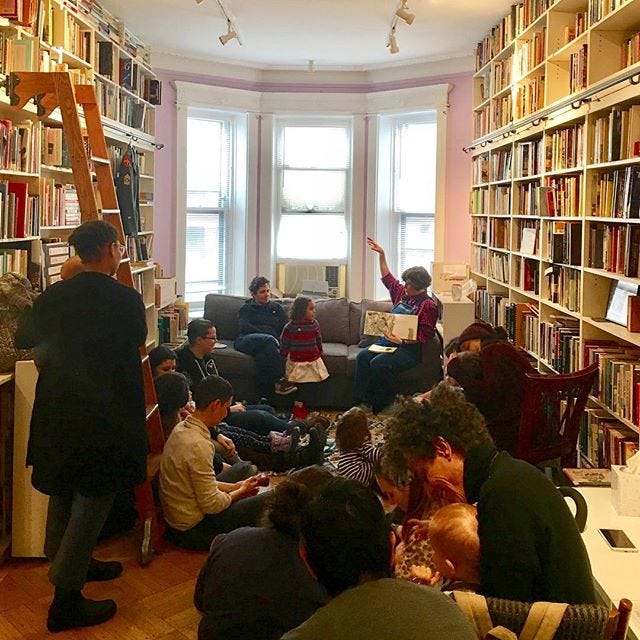The Watermelon Woman "Dunyementary"
1996 film captures the politics, drama, and spirit of the Archive.
“Queer performance gives expression to the cultural memory that is otherwise lost to amnesia.” — Ann Cvetkovich.
If you are in Peterborough, Trent Film Society will screen the landmark film The Watermelon Woman (1996), directed by Cheryl Dunye, on Tuesday, February 27th, at Sadleir House (751 George Street N) starting at 7 PM with a pre-show.
The movie is about an amateur filmmaker named Cheryl (played by the director Cheryl Dunye), who “becomes obsessed with uncovering the life of the mysterious ‘Watermelon Woman,’ an African American actress” who plays the stereotypical “mammy” roles in old Hollywood films — a figure cast aside in cinematic history with little information around.
Through interviews and trips to libraries and archives, Cheryl slowly pieces together the story of Fae Richards, whose offscreen life includes a romance with her white director, Martha Page (inspired by real-life American film director Dorothy Arzner). The Watermelon Woman takes a page from David Holzman’s Diary: Dunye incorporates direct address-to-camera video diary segments, in which she reports on the ongoing “video project” within the film to remix truth to underscore the actuality. A “Dunyementary” [1] describes her hybrid filmmaking style, blending documentary and fiction.
Academics teach the film, yet it is a funny and sexy movie. Critic Michael Koresky [2] calls it a “romcom” — a romantic comedy, and yet it also began to look and criticize the concept of the “archive.” Critic Thomas Allen Harris [3] says it captures the Archive’s politics, drama, and spirit. “The film elevates the institution to a new level of widespread visibility by making fun of it,” says Ann Cvetkovich. [4]
As part of her quest, Cheryl makes the trip from Philadelphia to New York to visit (C.L.I.T.) the Center for Lesbian Information and Technology. The archivist informs Cheryl that they do not file or index the materials because the place is a “volunteer-run” collective. They tell Cheryl she can only photograph the materials with the consensus-based approval of the collective, which meets only every other month.
“Those in the know,” says Cvetkovich, “would recognize CLIT as a parody of the Lesbian Herstory Archives (L.H.A.). While some might not find the joke funny, its humour can be a form of respect and affection, demonstrating the vital place of the archive in the popular lesbian imagination.”
Film and food writer Mayukh Sen says he can relate to the character’s search. “He [too] chases many people at the margins of culinary history for his work.” He says, “The Watermelon Woman shows the need to build alternate histories that don’t exist on this side of the dominant established white canon.”
In a scene that takes place in the archives, Sen points out, “This white woman just dumps [the box of archives] out on the table in a really violent and inconsiderate way — disrespecting history so casually…” He says, “There is another moment in that scene where she chides Cheryl for filming the documents in those boxes and says, ‘Respect your sisters; this is a safe space.” Sen thinks it is hilarious “how the gatekeeper is getting to use the language of allies to really hold on to whatever power they have.”
Artist and filmmaker Thomas Allen Harris, teaches the film in a course called Family Narratives, Cultural Shifts, which examines personal films by filmmakers and artists who mine their family albums to shed light on more significant social movements. He tells his students that, until very recently, to delve into the archives to begin to look for black queer ancestors, one had actually to go to a physical place/space. “You had to engage with a gatekeeper if not several gatekeepers — it was before the digital space, where [now] everything, in some ways, is available.”
“The archive has always been a pledge, and like every pledge, a token of the future,” says Jacques Derrida in Archive Fever. [5] It is a kind of “archive fever” that drives Cheryl to search for evidence of The Watermelon Woman when she notices the official record is incomplete and, worst yet, encounters downright deniers. In some ways, the film is about this “fever” itself.
Cheryl works at a video store, and essentially, she is also a gatekeeper. She gets free access to the material to feed her needs; it has trapped her into needing a constant fix. Fever is a kind of addiction to information. She curates lost treasures for customers, reclaiming the material in the margins. To hide their identities, they order through customer’s names to acquire rare material. The endless stream of video store customers is screened and processed before being given access to the goods. Dunye’s character recommends titles to customers — which parallels the critic who influences the making of a list of films considered the “best” — a canon, which often are the only ones deemed worth preserving.
Derrida says, “‘Archive’ is only a notion, an impression associated with a word.” For the video project within the film, Cheryl seeks all types of archivists and archives, from shoeboxes to shelves; she confronts those who do not believe in the archive, and simultaneously makes her own by recording everything — which is another fever — the restless urge to fill in the archive’s blanks by making files. She mines memories by barrelling right in to extract with her camera. There is no time to don white gloves or put out that cigarette to get at the archive — the archive is now.
Ultimately, she walks away with the material for her film; her project is the beast she needs to keep feeding. The camera shoots out the window to capture the present-day urban facades of Philadelphia [just like Josh and I did for our film My Way — an attempt to quote Jim Jarmusch — and] to preserve the ephemeral urbanscape. The film itself is an archive.
Functioning as an actual home, visitors at the Lesbian Herstory Archive can browse through the filing cabinets and shelves at their leisure rather than having to negotiate closed stacks. Conceived more as a community centre than a research institution, one of L.H.A.’s original missions was to provide a space for lesbian-owned documents “that might otherwise be left to neglect or destroyed by indifferent or homophobic families” says Ann Cvetkovich. “L.H.A. aims to provide an emotional rather than a narrowly intellectual experience.”
Cvetkovich says, “Both L.H.A. and its representation in The Watermelon Woman point to the vital role of archives within lesbian cultures and their innovative and unusual forms of appearance. They demonstrate the profoundly affective power of a helpful archive, especially an archive of sexuality and gay and lesbian life, which must preserve and produce knowledge and feeling.”
Thomas Allen Harris says, The Watermelon Woman “helps students think about ways they can incorporate their own family and extended family and communities in making their works, and in so doing, they’re making their own archives.” Furthermore, films can transform vaulted artifacts into an archive of (cinematic) feeling.
An elder in the film asks: “Make our history before we’re all dead and gone.” With The Watermelon Woman Dunye has told a counter-history, in part, through creating a counter-archive. Criterion has remastered and re-issued it, making it much more likely to stand the test of time. New generations are now screening it. Everyone can now access the film, and it can inspire new viewers. Having accrued cultural capital in over twenty years, it is now considered a solid part of a revised canon.
Notes
Dunyementaries: The Videos of Cheryl Dunye https://bampfa.org/event/dunyementaries-videos-cheryl-dunye
“Critic and Queersighted programmer Michael Koresky and food and film writer Mayukh Sen discuss Cheryl Dunye’s landmark film.” Criterion Channel https://www.criterionchannel.com/videos/watermelon-woman-intro
“Alexandra Juhasz in Conversation with Thomas Allen Harris.” Criterion Channel. https://www.criterionchannel.com/videos/alexandra-juhasz-and-thomas-allen-harris
Ann Cvetkovich. An Archive of Feelings: Trauma, Sexuality, and Lesbian Public Cultures. Duke University Press, 2003.
Jacques Derrida. Archive Fever: A Freudian Impression. Translated by Eric Prenowitz. The University of Chicago Press, 1995.
Images
https://outonscreen.com/blog/2020/news/indisputably-real-cheryl-dunyes-the-watermelon-woman/
https://lesbianherstoryarchives.org/collections/
Video Clips
The Watermelon Woman, clip 2
Cheryl Dunye Interview Clip - Criterion Channel




